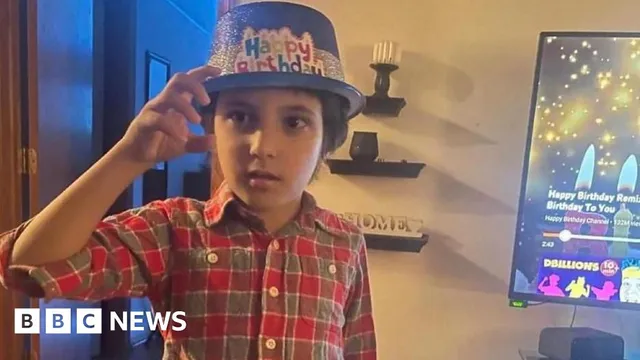
Illinois landlord murders 6-year-old Muslim boy in hate crime
2025-05-02 18:50- Joseph Czuba was convicted of murdering Wadee Alfayoumi and injuring his mother, Hanan Shaheen.
- The attack took place shortly after the outbreak of the Gaza conflict in 2023, raising fears of anti-Muslim discrimination.
- Czuba is facing a significant prison sentence, with community responses reflecting grief and calls for justice.
Express your sentiment!
Insights
In Illinois, a tragic incident unfolded shortly after the outbreak of the Gaza war in 2023. Joseph Czuba, a 73-year-old landlord, was found guilty of murdering 6-year-old Wadee Alfayoumi, a Palestinian American boy, and severely injuring his mother, Hanan Shaheen. The attack occurred in the family's home days after hostilities erupted, highlighting escalating tensions against Muslims in the area. Testimony from Hanan revealed the horrifying circumstances of the attack, as Czuba insisted they must leave because they were Muslims before turning violent. The murder trial revealed the disturbing facts surrounding the case. Joseph Czuba's actions were fueled by his agitation over the conflict, which led him to confront Hanan and subsequently attack Wadee. During the trial, jurors listened to testimonies and saw graphic evidence as prosecutors detailed the events of that fateful day. Czuba wielded a knife and inflicted 26 stab wounds on the young boy, leaving the weapon lodged in the child's body. The heinous nature of the crime resonated throughout the community, particularly resonating with undocumented feelings of fear and discrimination surfacing among the Palestinian population. Following the conviction in February, Czuba faces a prison sentence ranging from 20 to 60 years, or potentially life in prison, as Illinois does not have the death penalty. The hearing on May 2, 2025, aimed to decide the exact sentence he would receive, amidst conflicting proclamations of justice by the community and his defense attorneys. They suggested that there were uncertainties within the prosecution's case, which were overshadowed by the grotesque facts that transpired on that tragic day. This horrific incident triggered a federal investigation led by the U.S. Department of Justice into potential hate crimes, reflecting a broader societal issue regarding discrimination against Muslims. The attack has created ripples of fear within the community and prompted discussions about safety for Palestinians in the U.S., as expressed in memorials and dedications such as a park playground named in Wadee’s honor. This tragic event is not merely a local incident but illustrates the sad realities of rising hate crimes associated with global conflicts.
Contexts
Hate crime statistics in Illinois provide key insights into the prevalence and nature of hate-motivated offenses across the state. Hate crimes are defined as criminal acts that are motivated, in whole or in part, by bias against a particular group based on race, ethnicity, religion, sexual orientation, gender identity, or other characteristics. Understanding these statistics is crucial for law enforcement agencies, policymakers, community leaders, and researchers to address and combat hate crimes effectively. Over the years, there has been a growing awareness of hate crimes, and reporting mechanisms have improved, allowing for better tracking and analysis of data. It is important to note that while the statistics may reflect reported incidents, they do not necessarily capture the full scope of hate crimes, as many remain unreported due to fear, stigma, or mistrust in law enforcement. The Illinois State Police and various other organizations compile and publish hate crime statistics annually. According to the most recent available data, the number of reported hate crimes in Illinois has shown fluctuations, with some years experiencing an increase in incidents, particularly those targeting specific communities. Notably, hate crimes targeting individuals based on their race or ethnicity consistently account for a significant portion of reported incidents. In recent years, there has been a concerning trend in hate crimes targeting the LGBTQ+ community, indicating a need for increased protective measures and community outreach. Efforts to combat hate crimes in Illinois can be seen through various initiatives, including educational programs, advocacy, and stronger community-policing strategies. Law enforcement agencies have been working to establish better reporting practices while also engaging with affected communities to foster a sense of trust and safety. Collaboration between government agencies, non-profit organizations, and community groups is essential in addressing the root causes of hate crimes and promoting social cohesion. Public awareness campaigns also play a key role in encouraging reporting and educating the community about the consequences of hate crimes. Overall, hate crime statistics in Illinois underline the importance of continued vigilance and action against bias-motivated offenses. Statistical data serves not only as a tool for understanding the prevalence of these crimes but also highlights the urgent need for community-based solutions. By fostering inclusive and supportive environments, stakeholders can play a significant role in reducing hate crimes and promoting acceptance across diverse communities.